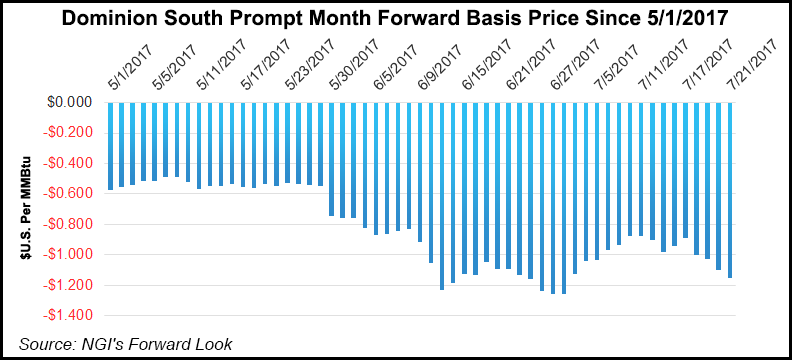Regulatory | Infrastructure | NGI The Weekly Gas Market Report
West Virginia DEP Tells Rover to Suspend Activity Over Water Pollution Violations
The West Virginia Department of Environmental Protection (WVDEP) has ordered Energy Transfer Partners LP’s (ETP) Rover Pipeline LLC to cease and desist development activities because of violations under the project’s state-issued water pollution control permit.

In an order issued last week and filed with FERC Monday, WVDEP said Rover must suspend “land development activity until such time when compliance with the terms and conditions of its permit and all pertinent laws and rules is achieved.”
WVDEP conducted site inspections of Rover construction in progress on April 26 and July 12 and said it observed several violations related to improper sediment and erosion controls. The alleged violations occurred as Rover constructed its Sherwood Lateral and Sherwood Compressor Station in West Virginia’s Doddridge and Tyler counties.
Rover has been ordered to “immediately install and maintain necessary stormwater and sediment/erosion control devices to prevent the release of sediment-laden water into the waters of the state” and to submit a detailed plan of corrective action.
Asked about the order, ETP spokeswoman Alexis Daniel said the operator would “continue to work with” WVDEP “to resolve these issues in a manner that is satisfactory to all parties.” Construction continues, she said, in West Virginia’s Hancock and Marshall counties.
The 710-mile greenfield project to transport 3.25 Bcf/d of Marcellus and Utica shale natural gas to markets in the Midwest, Gulf Coast and Canada received a certificate from the Federal Energy Regulatory Commission in February, a few months later than ETP had planned. Since then, ETP has moved forward with an accelerated construction schedule, accumulating various run-ins with regulators.
In May, the Ohio Environmental Protection Agency cited Rover for violating environmental laws, most notably a roughly 2 million gallon spill of horizontal directional drilling (HDD) fluids near the Tuscarawas River in Stark County, OH. The spill later prompted FERC to suspend HDD activities for the project pending a third party review. FERC’s Office of Enforcement launched an investigation of the Tuscarawas HDD incident after test results indicated the presence of diesel fuel in the drilling mud.
Meanwhile, Ohio EPA asked the state’s attorney general topursue hundreds of thousands in civil penalties over the alleged violations occurring during Rover’s construction.
Rover was originally scheduled to come online in two phases this year. Phase 1, connecting production from Ohio, West Virginia and Pennsylvania to the Midwest Hub in Defiance, OH, was scheduled to come online this month. But after FERC said it would withhold in-service authorization pending additional clean-up and mitigation for the Tuscarawas spill, ETP pushed back start-up for Phase 1 to “late summer.”
Though it has challenged Ohio EPA’s enforcement authority over the project, Rover recently submitted a plan to address concerns raised by FERC and Ohio EPA as it looks to stay on schedule.
Phase 2, extending to an interconnect with the Vector Pipeline in Michigan and to the Dawn Hub in Ontario, remains on schedule to enter service in November, ETP has said.
During a conference call in May, CEO Paul Rady of Antero Resources Corp. indicated that the Sherwood Lateral would service Antero’s Sherwood processing facility in Doddridge County and is part of Rover’s Phase 2. Antero has committed to 800 MMcf/d on Rover.
The market has watched Rover closely given the project’s potential to uncork significant new volumes of Appalachian shale production.
According to NGI’s Forward Look, Dominion South prompt month forward basis prices have nearly doubled since early May, when Rover’s regulatory issues first began to raise the prospect of a delay. On May 1, the Dominion South prompt month was trading at a negative 58 cent/MMBtu basis to Henry Hub. As of July 21, that basis had widened to negative $1.15/MMBtu.
Rover’s regulatory troubles may have contributed to Dominion South looking more bottlenecked than it was a few months ago, but “there is probably a good bit of seasonality” behind the change, NGI Markets Analyst Nate Harrison said.
Before the start of construction, FERC scrutinized Rover for demolishing a historic home in Ohio near a planned compressor station without first notifying the Commission. FERC staff recently issued a notice alleging Rover’s demolition of the house violated the project’s certificate.
© 2024 Natural Gas Intelligence. All rights reserved.
ISSN © 1532-1231 | ISSN © 1532-1266 |
